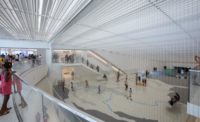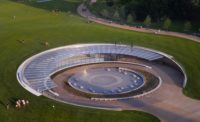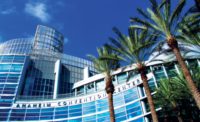Gateway Arch Awarded LEED Certification

The Gateway Arch Park Foundation is pleased to announce that the newly renovated Visitor Center and Museum at the Gateway Arch have been awarded LEED Gold in recognition of the building’s sustainable site development, water savings, and building materials selection.
The LEED (Leadership in Energy and Environmental Design) rating system, developed by the U.S. Green Building Council (USGBC), is the nation’s most widely recognized and accepted green building rating system. The Visitor Center and Museum join the exclusive ranks of only 10 other LEED certified sites in the National Park Service and 185 LEED projects in St. Louis.
Cooper Robertson and James Carpenter Design Associates, with Trivers Associates, designed the expanded and renovated Visitor Center and Museum at the Gateway Arch. Ground breaking on the project took place in April 2015 and was opened to the public July 2018.
“The National Park service has ambitious sustainability goals that the design team embraced enthusiastically. In addition to a 3.1-acre extensive green roof, the building features further sustainable and resilient design components such as LED lighting, high-efficiency HVAC systems, and close connections to local public transportation networks. These features bring a high level of efficiency that matches the National Park Service’s ambition. The LEED Gold certification recognizes that commitment and design innovation.” said, Scott Newman FAIA, Director, Cooper Robertson
Features of the Visitor Center and Museum at the Gateway Arch that contribute to the LEED Gold certification:
- 99% of the roof of the new Museum at the Gateway Arch is vegetated. This drastically reduces the “Heat Island Effect” and maximizes the amount of open park space. This results in an unimpeded view of the Gateway Arch and more room for visitors to roam and explore the grounds on foot.
- More than 80% of the construction waste and demolition debris generated by the project has been diverted from landfills or incineration facilities.
- Low flow water fixtures reduce the overall project’s potable water usage by more than 31% from the baseline.
- Energy cost savings for the project is 24% below the baseline.
- Materials used throughout the project were selected based on their recycled content, are regionally extracted and manufactured (within 500 miles), and wood products have met responsible forest management requirements.
- Low emitting materials were selected to benefit the indoor air quality.
- Throughout the project there are dedicated areas for the collection and storage of materials for recycling.
- The project is closely connected to local public transportation systems including two Metrolink stops, Arch/Laclede’s Landing and 8th & Pine, that are within a half-mile walking distance and provide more than 450 combined stops per day.
The LEED Gold recognition is for the Visitor Center and Museum at the Gateway Arch. Additional measures across the national park grounds ensure the entire Gateway Arch National Park is environmentally smart. The park is as sustainable as it is majestic. Water cisterns collect or recycle stormwater and guard the Mississippi River and reflecting ponds from run-off. The North Gateway replaced a parking garage and is now a “carbon sink” that drains emissions from the air. Tree soil, bioswale soil, and structural soils were custom mixed to ensure healthy plant growth. Liquid Biological Amendment (compost tea) restores missing organisms and nutrients to the soil. Radishes were planted to naturally aerate the ground and as they decomposed, enriched the soil.
“We are proud of the thoughtful planning and implementation of the sustainable initiatives that went into the renovation and construction of the new Visitor Center and Museum at the Gateway Arch,” said Mike Ward, Superintendent Gateway Arch National Park. “Reducing our environmental impact is a top priority across the National Park Service. The sustainability measures we instituted here meet that goal and they also create an enjoyable visitor experience across our beautiful park.”
Looking for a reprint of this article?
From high-res PDFs to custom plaques, order your copy today!





